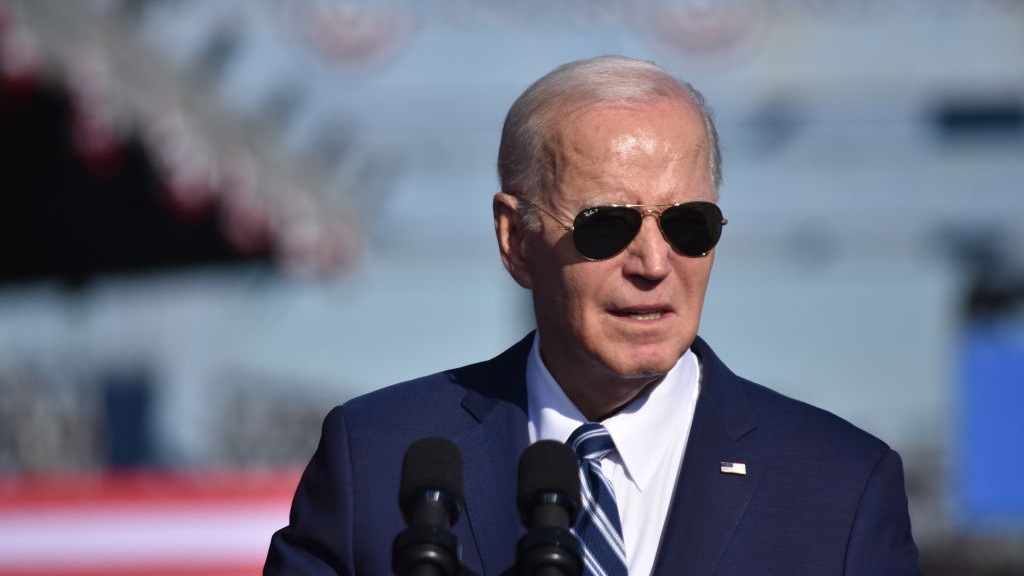Biden will visit Israel to affirm solidarity after Hamas attack, focus on Gaza aid in Jordan
President Biden is making a high-stakes, high-risk trip to the Middle East as the Israel-Hamas war threatens to spark a regional conflagration


A free daily email with the biggest news stories of the day – and the best features from TheWeek.com
You are now subscribed
Your newsletter sign-up was successful
President Biden will travel to Israel on Wednesday "to stand in solidarity in the face of Hamas' brutal terrorist attack," Biden tweeted Monday night. "I'll then travel to Jordan to address dire humanitarian needs." He will meet in Amman with Jordan's King Abdullah II, Egyptian President Abdel Fattah el-Sisi and Palestinian President Mahmoud Abbas, White House national security spokesperson John Kirby said.
The Biden administration has been sending military supplies to Israel, reiterating that Tel Aviv has a right and duty to go after Hamas, and trying to prevent the conflict from spreading into a regional conflagration. Biden and other U.S. officials have also stressed to Israeli leaders "that once Israel is seen blowing up buildings and triggering Palestinian casualties, public sentiment around the world could change dramatically," The New York Times reported. "It would focus less on the Oct. 7 terrorist attack, with its scenes of burned bodies and massacred children, and more on the brutality of the response."
Secretary of State Antony Blinken announced Biden's trip Monday evening after nearly eight hours of meetings with Israeli officials in Tel Aviv. He waited to announce the visit until after the U.S. team "received commitments from Israeli Prime Minister Benjamin Netanyahu on a humanitarian package" for civilians trapped in Gaza with little food, water, medicine, or fuel amid Israel airstrikes, The Washington Post reported, citing two U.S. officials. "It is critical that aid begin to flow into Gaza as soon as possible," Blinken said.
The Week
Escape your echo chamber. Get the facts behind the news, plus analysis from multiple perspectives.

Sign up for The Week's Free Newsletters
From our morning news briefing to a weekly Good News Newsletter, get the best of The Week delivered directly to your inbox.
From our morning news briefing to a weekly Good News Newsletter, get the best of The Week delivered directly to your inbox.

Blinken did not give details on the humanitarian agreement. "The provision of humanitarian aid is sensitive in Israel, especially among far-right politicians tied to Netanyahu who have pressed him to wage a scorched-earth campaign in Gaza," the Post reported. Egypt, meanwhile, has been reluctant to open its borders to Palestinian refugees. The U.S. plan envisions allowing people with U.S. and other Western passports to leave Gaza through the Rafah crossing into Egypt while trucks of international aid waiting on the Egyptian side of the border drop off their supplies on the Gaza side, The Wall Street Journal reported.
German Chancellor Olaf Scholz also announced Monday night that he will visit Israel and Egypt starting Tuesday.
A free daily email with the biggest news stories of the day – and the best features from TheWeek.com
Peter has worked as a news and culture writer and editor at The Week since the site's launch in 2008. He covers politics, world affairs, religion and cultural currents. His journalism career began as a copy editor at a financial newswire and has included editorial positions at The New York Times Magazine, Facts on File, and Oregon State University.
-
 6 exquisite homes with vast acreage
6 exquisite homes with vast acreageFeature Featuring an off-the-grid contemporary home in New Mexico and lakefront farmhouse in Massachusetts
-
 Film reviews: ‘Wuthering Heights,’ ‘Good Luck, Have Fun, Don’t Die,’ and ‘Sirat’
Film reviews: ‘Wuthering Heights,’ ‘Good Luck, Have Fun, Don’t Die,’ and ‘Sirat’Feature An inconvenient love torments a would-be couple, a gonzo time traveler seeks to save humanity from AI, and a father’s desperate search goes deeply sideways
-
 Political cartoons for February 16
Political cartoons for February 16Cartoons Monday’s political cartoons include President's Day, a valentine from the Epstein files, and more
-
 Epstein files topple law CEO, roil UK government
Epstein files topple law CEO, roil UK governmentSpeed Read Peter Mandelson, Britain’s former ambassador to the US, is caught up in the scandal
-
 Iran and US prepare to meet after skirmishes
Iran and US prepare to meet after skirmishesSpeed Read The incident comes amid heightened tensions in the Middle East
-
 Israel retrieves final hostage’s body from Gaza
Israel retrieves final hostage’s body from GazaSpeed Read The 24-year-old police officer was killed during the initial Hamas attack
-
 China’s Xi targets top general in growing purge
China’s Xi targets top general in growing purgeSpeed Read Zhang Youxia is being investigated over ‘grave violations’ of the law
-
 Panama and Canada are negotiating over a crucial copper mine
Panama and Canada are negotiating over a crucial copper mineIn the Spotlight Panama is set to make a final decision on the mine this summer
-
 Why Greenland’s natural resources are nearly impossible to mine
Why Greenland’s natural resources are nearly impossible to mineThe Explainer The country’s natural landscape makes the task extremely difficult
-
 Iran cuts internet as protests escalate
Iran cuts internet as protests escalateSpeed Reada Government buildings across the country have been set on fire
-
 US nabs ‘shadow’ tanker claimed by Russia
US nabs ‘shadow’ tanker claimed by RussiaSpeed Read The ship was one of two vessels seized by the US military
